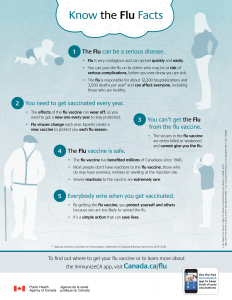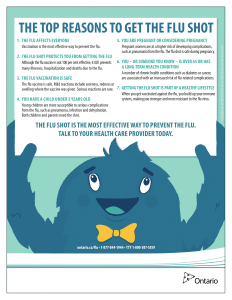Click to enlarge the flu posters below.
Monitor the Flu Activity in the Niagara Region
Video Resources about the Flu
Antibiotic Awareness “Sorry, but no amount of Antibiotics is going to get rid of your cold”
NNFHT Quality Improvement Committee Initiative (Nov 2019)
Antibiotics don’t work against common cold and flu viruses and are often unnecessary for some bacterial infections.
Unnecessary antibiotic use is contributing to a rise in resistant bacteria, making infections much harder, and increasingly impossible to treat.
During the month of November the NNFHT will be providing educational resources for patients about the misuse of antibiotics.
Watch the video below and scroll down to become more antibiotic aware!
WHAT ARE ANTIBIOTICS?
- Antibiotics are medicines that fight infections caused by bacteria
- They are NOT used for infections caused by viruses (such as colds or flu)
WHAT IS ANTIBIOTIC RESISTANCE?
- Antibiotic resistance happens when bacteria that cause illness become resistant to the antibiotic drugs used to treat them
- Taking antibiotics when you do NOT need them can prevent them working when you DO need them
WHY SHOULD I BE CONCERNED ABOUT ANTIBIOTIC RESISTANCE?
- Antibiotic resistant infections can take longer to treat, may require more frequent doctor visits, possible hospital stays and more severe side effects
- In Canada, a growing number of infections are not responding to antibiotics. Infections that do require antibiotics are becoming harder, and sometimes impossible, to treat
- Antibiotic resistance results in a decreased ability to treat infections and illnesses leading to increased human illness, suffering and sometimes death
- In some provinces, experts estimate that tens of thousands of illnesses per year result from resistant bacteria
HOW DO I KNOW IF I DO NEED AN ANTIBIOTIC?
- Some common reasons for prescribing antibiotics include strep throat, urinary tract infections, and pneumonia
- Many common infections could be caused by viruses, or get better on their own without medication
- Your healthcare provider will decide whether or not antibiotics are required based on your situation
AS A PATIENT, WHAT CAN I DO?
- Speak with your healthcare provider about the right treatment, and how to use antibiotics responsibly. Ask: will an antibiotic help?
- Never share or use leftover antibiotics (return unused medications to the pharmacy)
- Reduce your risk of getting sick by regularly washing hands, avoiding close contact with sick people, keeping your germs to yourself (cover your cough/sneeze) or stay home if you are unwell and clean/disinfect common surfaces with soap and water
- Keep your vaccinations up-to-date (get the flu shot!)
- When you do need to use antibiotics, take them as they were prescribed (take the exact amount, at the right time, for the amount of time they were prescribed for)
WHERE CAN I FIND MORE INFORMATION?
- You can always talk to your healthcare provider for more information about antibiotics and antibiotic misuse
- visit www.antibioticwise.ca
- visit www.canada.ca
- visit www.who.int
Information from www.antibioticwise.ca, www.who.int and www.canada.ca



